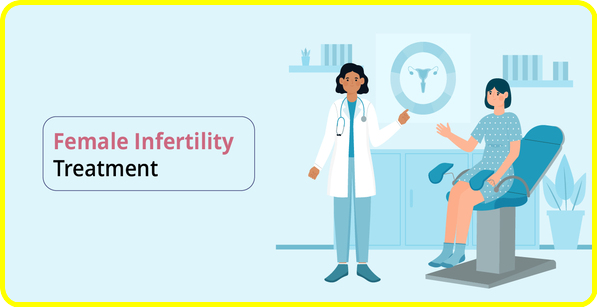Infertility might happen while you are trying to conceive for more than one year but remain unsuccessful with that. There are many causes of female infertility leading to failed pregnancy. Moreover, one-third of the time the reason is due to both male and female partners. It is easier to diagnose and treat infertility through Assisted Reproductive Techniques. There is numerous female infertility treatment based on these causes.
What are the infertility symptoms?
The primary infertility symptom is the inability to conceive a child. A major sign of infertility is the menstruation cycle that lasts for more than 35 days or less than 21 days. An irregular menstruation cycle also means that there is no ovulation. Unfortunately, there are no other symptoms or signs of infertility.
What is the diagnosis of infertility?
The fertility specialist can diagnose your infertility with the help of the following tests.
· Ovulation testing
An ovulation prediction kit detects the increase in LH (Luteinizing Hormone) in the body before ovulation. The doctor might also suggest a progesterone blood test to detect ovulation.
· Hysterosalpingography
In this test, the doctor inserts an X-ray contrast inside the uterus. This examination finds out if there is any problem inside the uterus, such as fluid spilling out from the fallopian tubes.
· Imaging Test
A doctor might look for any disease in the fallopian tube or uterus through a pelvic USG. Sometimes, doctors also carry out sonohysterograms or hysteroscopies to examine the inside of the uterus in detail, which might not be clear in a regular USG.
· Hormone Testing
Hormone testing examines the appropriate levels of ovulatory, pituitary and thyroid hormone. It will control the reproductive procedures.
Different Types of Female Infertility Treatment
The couples’ age and other factors influence the female infertility treatment. Since infertility is a complicated condition, female infertility treatment includes a vital amount of psychological, time, and physical commitments. You can opt for fertility medicines, surgeries, or ART (Assisted Reproductive Techniques).
1. Fertility Medicines
· Clomiphene Citrate
It helps to stimulate ovulation by releasing more LH and FSH hormones for the growth of the ovarian follicle, including an egg.
· Metformin
When one of the primary reasons for infertility is insulin resistance, doctors recommend Metformin.
2. Surgeries
· Hysteroscopic or Laparoscopic surgery
This surgery is helpful in accessing and viewing the ovaries, uterus, fallopian tubes and other segments in the pelvis.
· Tubal Surgeries
This surgery removes any dilate, tube, or adhesions in the fallopian tubes.
3. ART
Two of the most commonly used ART methods include IUI and IVF. During IUI, fertility specialists insert millions of sperm inside the uterus during ovulation. In IVF, the doctors retrieve the matured eggs from the ovaries, fertilizing with sperm in a dish in a secured environment and then inserting them inside the uterus after fertilization.
FAQ
What is the best blood test done before starting the female infertility treatment?
AMH or Ovarian Reserve test offers an estimate of the total number of fertilized eggs your ovaries can produce. The doctor will examine the results and will inform you know if your ovarian reserve is adequate for the age. After this, they will start your female infertility treatment.
Summing it up
Infertility can be really stressful for those couples who are planning to have their baby for years. If you are more than 35 years of age trying to conceive for a year without unprotected sex or any other reason, you can contact the best doctor for female infertility treatment. They will identify the causes of female infertility and give a customized treatment plan. Don’t worry, as most couples can get pregnant after receiving the appropriate treatment.

